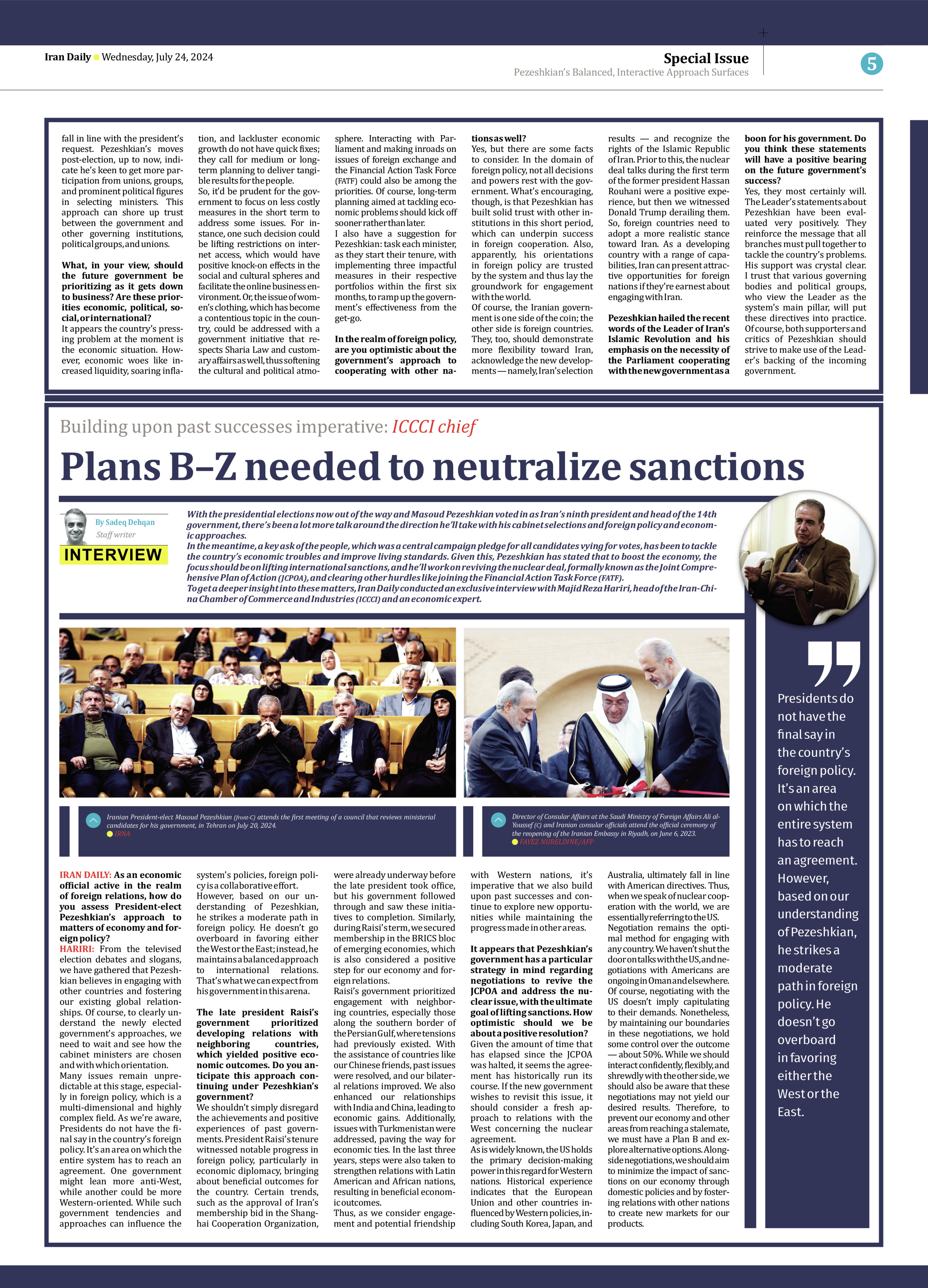
Building upon past successes imperative: ICCCI chief
Plans B–Z needed to neutralize sanctions
With the presidential elections now out of the way and Masoud Pezeshkian voted in as Iran’s ninth president and head of the 14th government, there’s been a lot more talk around the direction he’ll take with his cabinet selections and foreign policy and economic approaches. In the meantime, a key ask of the people, which was a central campaign pledge for all candidates vying for votes, has been to tackle the country’s economic troubles and improve living standards. Given this, Pezeshkian has stated that to boost the economy, the focus should be on lifting international sanctions, and he’ll work on reviving the nuclear deal, formally known as the Joint Comprehensive Plan of Action (JCPOA), and clearing other hurdles like joining the Financial Action Task Force (FATF). To get a deeper insight into these matters, Iran Daily conducted an exclusive interview with Majid Reza Hariri, head of the Iran-China Chamber of Commerce and Industries (ICCCI) and an economic expert.
By Sadeq Dehqan
Staff writer
IRAN DAILY: As an economic official active in the realm of foreign relations, how do you assess President-elect Pezeshkian’s approach to matters of economy and foreign policy?
HARIRI: From the televised election debates and slogans, we have gathered that Pezeshkian believes in engaging with other countries and fostering our existing global relationships. Of course, to clearly understand the newly elected government’s approaches, we need to wait and see how the cabinet ministers are chosen and with which orientation.
Many issues remain unpredictable at this stage, especially in foreign policy, which is a multi-dimensional and highly complex field. As we’re aware, Presidents do not have the final say in the country’s foreign policy. It’s an area on which the entire system has to reach an agreement. One government might lean more anti-West, while another could be more Western-oriented. While such government tendencies and approaches can influence the system’s policies, foreign policy is a collaborative effort.
However, based on our understanding of Pezeshkian, he strikes a moderate path in foreign policy. He doesn’t go overboard in favoring either the West or the East; instead, he maintains a balanced approach to international relations. That’s what we can expect from his government in this arena.
The late president Raisi’s government prioritized developing relations with neighboring countries, which yielded positive economic outcomes. Do you anticipate this approach continuing under Pezeshkian’s government?
We shouldn’t simply disregard the achievements and positive experiences of past governments. President Raisi’s tenure witnessed notable progress in foreign policy, particularly in economic diplomacy, bringing about beneficial outcomes for the country. Certain trends, such as the approval of Iran’s membership bid in the Shanghai Cooperation Organization, were already underway before the late president took office, but his government followed through and saw these initiatives to completion. Similarly, during Raisi’s term, we secured membership in the BRICS bloc of emerging economies, which is also considered a positive step for our economy and foreign relations.
Raisi’s government prioritized engagement with neighboring countries, especially those along the southern border of the Persian Gulf, where tensions had previously existed. With the assistance of countries like our Chinese friends, past issues were resolved, and our bilateral relations improved. We also enhanced our relationships with India and China, leading to economic gains. Additionally, issues with Turkmenistan were addressed, paving the way for economic ties. In the last three years, steps were also taken to strengthen relations with Latin American and African nations, resulting in beneficial economic outcomes.
Thus, as we consider engagement and potential friendship with Western nations, it’s imperative that we also build upon past successes and continue to explore new opportunities while maintaining the progress made in other areas.
It appears that Pezeshkian’s government has a particular strategy in mind regarding negotiations to revive the JCPOA and address the nuclear issue, with the ultimate goal of lifting sanctions. How optimistic should we be about a positive resolution?
Given the amount of time that has elapsed since the JCPOA was halted, it seems the agreement has historically run its course. If the new government wishes to revisit this issue, it should consider a fresh approach to relations with the West concerning the nuclear agreement.
As is widely known, the US holds the primary decision-making power in this regard for Western nations. Historical experience indicates that the European Union and other countries influenced by Western policies, including South Korea, Japan, and Australia, ultimately fall in line with American directives. Thus, when we speak of nuclear cooperation with the world, we are essentially referring to the US.
Negotiation remains the optimal method for engaging with any country. We haven’t shut the door on talks with the US, and negotiations with Americans are ongoing in Oman and elsewhere. Of course, negotiating with the US doesn’t imply capitulating to their demands. Nonetheless, by maintaining our boundaries in these negotiations, we hold some control over the outcome — about 50%. While we should interact confidently, flexibly, and shrewdly with the other side, we should also be aware that these negotiations may not yield our desired results. Therefore, to prevent our economy and other areas from reaching a stalemate, we must have a Plan B and explore alternative options. Alongside negotiations, we should aim to minimize the impact of sanctions on our economy through domestic policies and by fostering relations with other nations to create new markets for our products.







